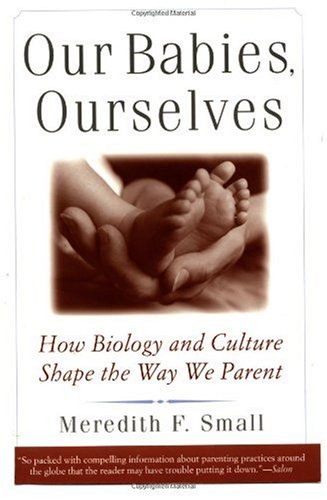Differing Definitions of Intelligence in Children
;ct. What parents want even influences the very ways they label children. Sara Harkness and Charles Super found that when parents in three cultures were asked about intelligence, their views of what constitutes a smart child differed.^^ In America, an "intelligent" child is one who is aggressive and competitive; in Holland, die intelligent child is one who is persistent, strong-willed, and demonstrates a clarity of purpose; for the Kipsigis Africans, the most intelligent child is the responsible one who does his or her chores.^^ Each household tries to provide a setting that is believed to foster the culture's particular brand of intelligence. Americans use all kinds of visual and verbal stimuli to catch the baby's attention and encourage it to interact. We line the crib with black-and-white signs to stimulate vision; we converse for hours in one-on-one lessons, convinced that this verbal interaction will improve cognitive abilities. Americans try to instill self-esteem in their children; self-esteem is a word not easily translated into other languages because the trait is not part of the cultural milieu of other groups—it is of import only in a competitive self-achieving society. The Dutch, in contrast, believe that regularity, rest, and cleanliness promote intelligent development, so much so that when children throw tantrums, as they do all over the world, parents assume there has been a break in the child's routine that has caused the episode. And Kipsigis parents load their children with chores. Beginning at two years old, an age at which Americans would call them toddlers, Kipsigis children are given household tasks. By the time they are six years old, these kids typically spend half of their time working for the family. People from each culture would be incapable of raising their children any other way. Imagine an American child doing househohold chores at two, with little playtime. We would mourn die loss of "childhood," that carefree time of exploration and development. In the same way, a Kipsigis mother would be horrified to see irresponsible, lazy American children with nothing to do but play games. How could that at child, she might comment, grow up with any brains at all? The point is t that we all agree in a general sense on what intelligence is, and we all agree that to be intelligent is better than being stupid, but each culture emphasizes and appreciates different aspects of intelligence.
Notes:
Three cultures and their definition of what fosters intelligence in a child.
Folksonomies: parenting intelligence child-rearing
Taxonomies:
/family and parenting/children (0.680055)
/science/computer science/artificial intelligence (0.238712)
/health and fitness/weight loss (0.236145)
Keywords:
smart child differed.^^ (0.979550 (neutral:0.000000)), competitive self-achieving society (0.943061 (negative:-0.578926)), intelligent child (0.929139 (neutral:0.000000)), children (0.926986 (negative:-0.421508)), lazy American children (0.912525 (negative:-0.608403)), Children Three cultures (0.787202 (neutral:0.000000)), fosters intelligence (0.784765 (neutral:0.000000)), Sara Harkness (0.781157 (neutral:0.000000)), verbal stimuli (0.780054 (positive:0.847536)), intelligent development (0.776156 (positive:0.421682)), Charles Super (0.763319 (neutral:0.000000)), Kipsigis Africans (0.760745 (neutral:0.000000)), cultural milieu (0.760500 (negative:-0.578926)), househohold chores (0.760498 (neutral:0.000000)), black-and-white signs (0.759557 (negative:-0.386596)), verbal interaction (0.757118 (positive:0.487851)), one-on-one lessons (0.753932 (positive:0.280451)), little playtime (0.744341 (negative:-0.522849)), cognitive abilities (0.742057 (positive:0.487851)), Kipsigis children (0.739313 (neutral:0.000000)), household tasks (0.732025 (neutral:0.000000)), carefree time (0.730537 (positive:0.601213)), different aspects (0.730237 (positive:0.645602)), Kipsigis parents (0.728442 (negative:-0.383084)), general sense (0.727718 (positive:0.506710)), Kipsigis mother (0.713878 (negative:-0.617212)), Americans (0.660921 (positive:0.520401)), self-esteem (0.597641 (negative:-0.453030)), way (0.575455 (negative:-0.581608)), tantrums (0.567361 (negative:-0.362323))
Entities:
America:Continent (0.902627 (positive:0.184595)), Kipsigis:City (0.507657 (negative:-0.617212)), Sara Harkness:Person (0.468007 (neutral:0.000000)), ct:StateOrCounty (0.465540 (neutral:0.000000)), Holland:Country (0.451641 (neutral:0.000000)), Charles Super:Person (0.420102 (neutral:0.000000)), six years:Quantity (0.420102 (neutral:0.000000)), two years:Quantity (0.420102 (neutral:0.000000))
Concepts:
The Culture (0.949697): dbpedia | freebase | yago
Childhood (0.909917): dbpedia | freebase
Developmental psychology (0.838793): dbpedia | freebase | opencyc
Child (0.730501): dbpedia | freebase | opencyc
Culture (0.722632): dbpedia | freebase | opencyc
The Child (0.700427): dbpedia
Intelligence (0.639333): dbpedia | freebase
2002 albums (0.637061): dbpedia





